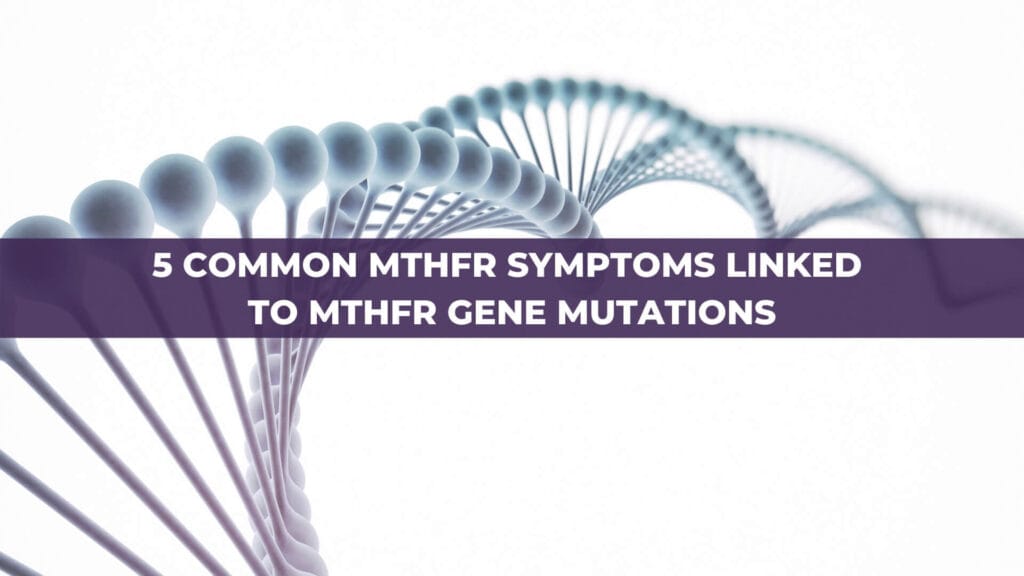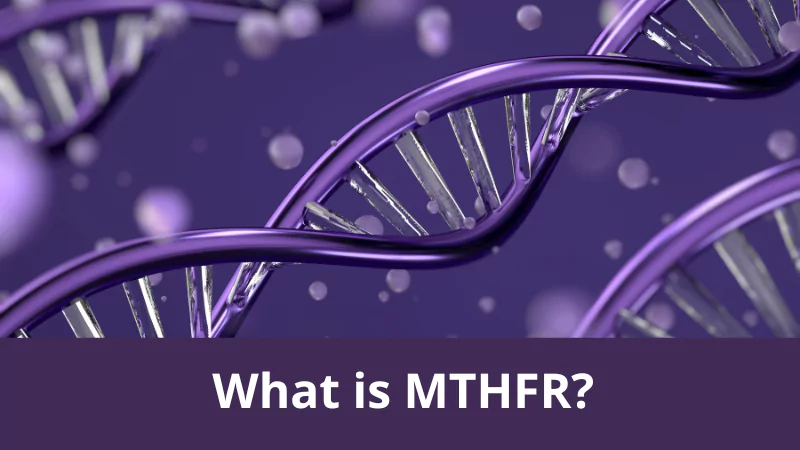MTHFR Symptoms are brought on by MTHFR gene mutations and commonly underlie many health problems.
With a few simple changes and some professional advice, you may be able to alleviate some symptoms laid out in this article. MTHFR is often overlooked. New research is showing how important it really is. You may be shocked to find out how many symptoms are linked to MTHFR gene mutations.
MTHFR gene mutations may lead to less methylation in your body. Less methylation means that a variety of complex biochemical changes can change over time, leading to health problems. Since everyone is unique, (for example family history, lifestyle, diet etc..) symptoms arising from MTHFR mutations vary from person to person.
Fortunately, depending on how your MTHFR mutation is affecting you, you can see vast improvements in your health by treating MTHFR mutations and restoring methylation. Knowing you have a gene mutation is the first step to treating MTHFR symptoms associated.
5 Common MTHFR Symptoms Linked To MTHFR Gene Mutations
-
Cardiovascular Conditions
-
- MTHFR mutation may be adding fuel to the fire of cardiovascular problems. The following is a list of cardiovascular conditions where MTHFR combined with an elevated homocysteine could be playing a role:
- High blood pressure
- Stroke
- Heart attack
- Deep vein thrombosis
- MTHFR mutation may be adding fuel to the fire of cardiovascular problems. The following is a list of cardiovascular conditions where MTHFR combined with an elevated homocysteine could be playing a role:
-
-
Multiple Miscarriages and troubles falling pregnant.
- Pregnancy is one of the most beautiful and complicated biological processes on earth. Due to the complex nature of pregnancy, the most important nutrients required for the baby’s growth and development and good DNA from Mum and Dad is active folate.Ensuring your active folate production is in tip-top shape during preconception and pregnancy is critical for a healthy and successful pregnancy.
- If you are thinking about becoming pregnant and want to learn more about MTHFR, preconception, and pregnancy. Check out Carolyn’s free checklist “10 most important things you need to do before you become pregnant”
- Problems arising from MTHFR mutation during pregnancy include:
- Miscarriage
- Down syndrome
- Neural tube defects (Cleft lip/palate and spina bifida)
- Elevated blood pressure
- Anencephaly, encephalocele
- Pregnancy is one of the most beautiful and complicated biological processes on earth. Due to the complex nature of pregnancy, the most important nutrients required for the baby’s growth and development and good DNA from Mum and Dad is active folate.Ensuring your active folate production is in tip-top shape during preconception and pregnancy is critical for a healthy and successful pregnancy.
-
Oestrogen Dominance
- Methylation plays a crucial role in the production/regulation of hormones within the human body. In some cases, problems with methylation are the underlying factor behind Oestrogen dominance, which can produce the following symptoms:
- Fibrocystic ovaries and breasts
- Tenderness and swelling of breasts
- Mood swings
- Irregular menstruation cycle
- Food cravings
- Thyroid dysfunction
- Heavy periods
- Painful Periods
- Endometriosis (overgrowth of tissue lining the uterus, this is often painful)
- Fibroids
- Methylation plays a crucial role in the production/regulation of hormones within the human body. In some cases, problems with methylation are the underlying factor behind Oestrogen dominance, which can produce the following symptoms:
-
Mental Health Problems
- Mental health problems can be influenced by imbalances in hormones and neurotransmitters caused by a lack of methylation. Remember that SAMe is essential for our brain chemicals and your active folate helps you build SAMe levels. Receiving treatment for your faulty MTHFR gene may aid in improving/relieving the following symptoms:
- Depression
- Anxiety
- Bipolar
- Migraines
- ADD/ADHD
- Brain fog (difficulty concentrating)
- Mental health problems can be influenced by imbalances in hormones and neurotransmitters caused by a lack of methylation. Remember that SAMe is essential for our brain chemicals and your active folate helps you build SAMe levels. Receiving treatment for your faulty MTHFR gene may aid in improving/relieving the following symptoms:
-
General MTHFR Symptoms and Conditions Of MTHFR Gene Mutations Include:
- Chronic inflammation
- Chronic fatigue
- Dizziness
- Hives
- Allergies
- Eczema
- Asthma
- Heightened reaction to allergens
- Elevated liver enzymes
- Increased red blood cell folate
- Decreased white cell levels
- Decreased immune function
- High Homocysteine levels
- Low B12
Common Medications That Reduce Methylation
Common medications may be reducing your ability to methylate by lowering B12 or overall folate levels. If less B12 and/or folate is available to use in your body, symptoms may become worse. Medications that could be interfering with your B12 and folate levels include:
- Antacids
- Cholestyramine
- Nitrous oxide – your dentist will often use this. Its known as laughing gas.
- Methotrexate
- Niacin (at high doses) – because Niacin uses methyl groups in its metabolism
- Theophylline
- Cyclosporin
- Metformin
- Phenytoin
- Bactrim – an antibiotic
- Sulfasalazine
- Triamterene
- Trimethoprim
- Ethanol
- Oral Contraceptive Pill
- Antimalarials
Conditions of Hypomethylation (Under Methylation)
MTHFR mutations cause widespread undermethylation throughout the body. Undermethylation is responsible for an enormous amount of health conditions that prevent you from living life to its fullest. Below you can find a comprehensive list (organized categorically) of conditions associated with undermethylation:
General Physiological Malfunctions
- Allergic conditions
- Aging
- Alzheimer’s Disease
- Asthma
- Autoimmune Disease
- Cancer
- Chronic degenerative diseases
- Cardiovascular disease
- Chronic fatigue
- Diabetes
- Poor detoxification
- Fibromyalgia
- Headaches
- Joint pain, stiffness, and swelling
- Muscle pain
- Low neurotransmitter levels
- Obesity
- Increased pain
- Thyroid dysfunction
Mental Health
- ADD/ADHD
- Addictive behaviors
- Anorexia
- Anxiety
- Bipolar
- Bulimia
- Delusions
- Depression
- Autism
- Insomnia
- Obsessive-compulsive disorder (OCD)
- Oppositional defiant disorder (ODD)
- Phobias
- Psychosis
- Schizophrenia
Pregnancy/Development
- Spina bifida
- Anencephaly
- Encephalocele
- Iniencephaly
- Down syndrome
- Infertility
- Polycystic ovary syndrome
- Recurrent pregnancy loss/miscarriage
Improving Your Health With An MTHFR Mutation
If you want to take back control of your methylation cycle right away, supplementing is a great way to fight back against your MTHFR gene mutation. Care must be taken when supplementing to ensure symptoms do not worsen. To get started now, you can take a look at our “How to get started with MTHFR supplements” video below, or, download our guide on how to start supplementing MTHFR products.
P.S. Carolyn has also prepared a full overview of the MTHFR Gene Mutation and Management. Grab a good spot to listen and take some time to educate yourself with this Patient Webinar, exclusive to our audience. In this video, Carolyn gives you a thorough overview of MTHFR and symptoms related.









